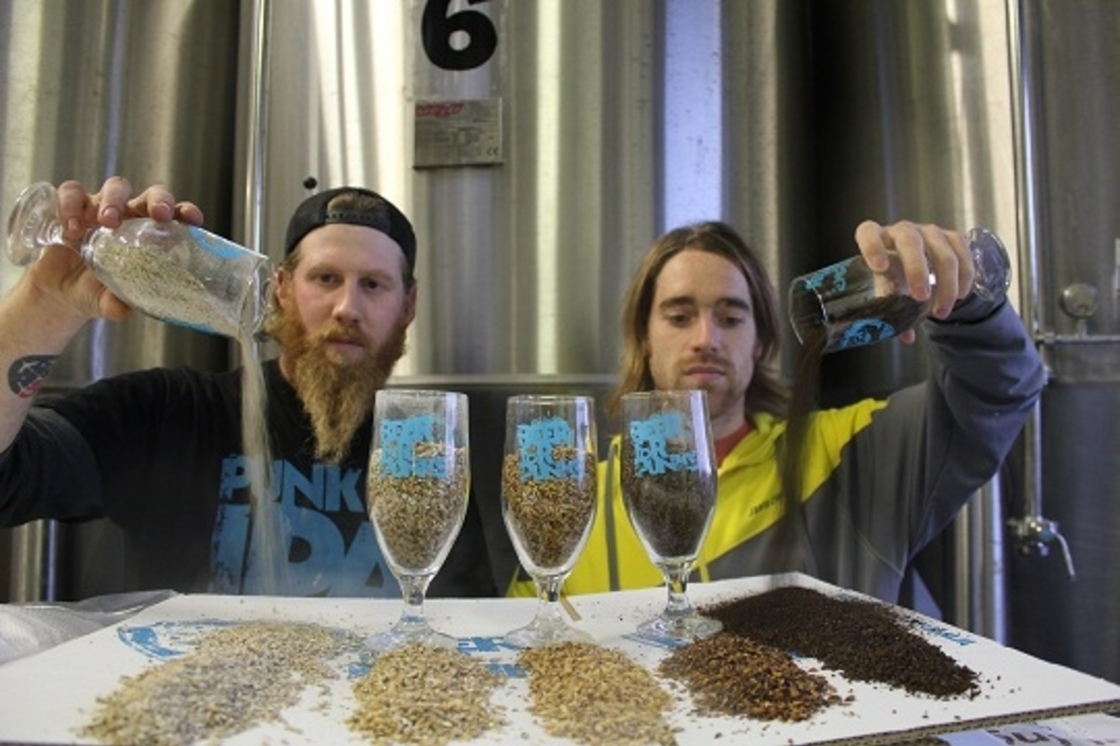How We Mash

Invest in BrewDog at www.brewdog.com/equityforpunks
Following on from our How We Bottle blog we thought we would give you a behind the scenes look at other parts of the brewing process, starting with mashing. Brewing is a pretty simple, natural process. We are taking malt, water, yeast and hops and trying to make something awesome.

Mashing happens in the inventively named Mash Tun. For each batch we brew we mix 1000 kilos of malted barley with hot water. We then wait, somewhat patiently, while the starch in the malt converts to sugar. It is this sweet solution (known as wort) which we will then drain from the mash tun and boil in the kettle. The sugars from the mash provide the fuel for the yeast to create alcohol and we also shape the beer and create the base of flavour in the mash tun. Here is how it goes down scamps.

Marris Otter Pale Malt - the backbone of all our beers.
Malt brings many things to a beer - flavour, colour, aroma and the sugar which ultimately creates the alcohol. When mixed with hot water the complex sugars in the malt are broken down and extracted into the liquid.

Getting ready to mash in some Punk IPA - each 25 kilo sack of malt is added by hand.

The malted barley is hydrated (mixed with hot water) as it enters the mash tun.

To ensure adequate mixing, we also mix the mash by hand with a plastic spade.
The amount of malt we use in relation to water, ultimately determines the ABV. More malt in relation to the water = more sugar in the solution = more fermentation = higher alcohol content. It is a little bit like making coffee, the more coffee beans in relation to the water you have, the stronger your coffee will be. The same is true for malt.

As the sugars dissolve into our wort, the liquid becomes denser. By measuring the density of the wort we can determine the Original Gravity. The higher the original gravity, the stronger the beer will be. As the beer ferments, the yeast eat up the sugars (more on this in a later blog) reducing the density of the liquid. By constantly measuring density during fermentation, we keep a tight control over a beer's progress and we know when it hits it's target alcohol content.
The original gravity of some of our beers is as follows:
Trashy Blonde - 1041
Punk IPA - 1053
Hardcore IPA - 1083
Tokyo* - 1140
The body of the beer is also determined in the mash tun, partly mainly by the mashing temperature. A higher strike (or mash) temperature can draw more from the malts meaning the resulting beer can have a thick viscous body whereas a lower strike temperate result in a beer with a much lighter mouthfeel. We mash Punk IPA in at 65 degrees.

Brewer George with a temperature sample of the mash.
We use a wide range of different types of malted barley to get different tastes, aromas and textures in the beers we brew. From the light Marris Otter malt to others which have been roasted to different temperatures which allow us to impart different flavours to our brews.

Stewart and Martin with 5 different malts. Marris Otter Pale Malt, Munich Malt, Caramalt, De-husked roasted Crystal Malt and Chocolate Malt.

The lightness of Punk IPA comes from the Marris Otter, with the Caramalt adding a little sweetness for the hops to play from. The dark, encapsulating cacao and coffee notes of Rip Tide comes from the Chocolate Malt, Dark Crystal Malt and heavily roasted malts we use in that beer.
After the mash has converted the starch to sugars and drawn colour, flavour and aroma from the malt we gentle add hot water (a process called sparging) to help flush out all this goodness and transfer the sweet solution to our kettle for boiling (more on the boiling process later too).

Brewer Andy with the wort of Hardcore IPA as it is transferred from Mash Tun to kettle. Ready to be boiled and hopped!

After the wort is transferred to the kettle, we are left with the spent grains in the mash tun.

The malt bed of spent malt in the mash tun after sparging.

The spent grains are then dug out from the mash tun and collected by a local farmer who uses them to feed his heard of cattle. He currently collects over 15 tons per week from us making for some very happy cows and a sustainable and environmentally friendly use for our used malts.

Head Brewer Stewart Bowman gets all the good jobs!
Look out for upcoming blogs on how we boil, ferment and dry hop!
Invest in BrewDog at www.brewdog.com/equityforpunks

Join the Discussion
Comments (12)